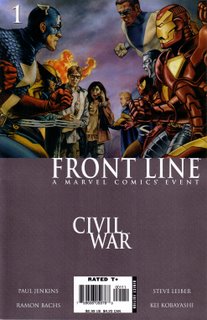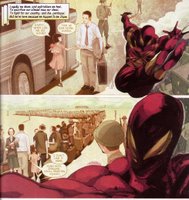Civil War: Front Line #1
 I don't mind being manipulated. Most art manipulates - good art manipulates well. I don't mind being led by the nose, and I don't mind it if the seams sometimes show. Sometimes, it's fun to be sucker-punched, to fall for the bait and swallow the hook. Allan Heinberg's debut on Wonder Woman this week manipulated me: setting me up to take each fall, making my emotions jump through hoops, cleverly using my expectations against me. There's a point where it's fun.
I don't mind being manipulated. Most art manipulates - good art manipulates well. I don't mind being led by the nose, and I don't mind it if the seams sometimes show. Sometimes, it's fun to be sucker-punched, to fall for the bait and swallow the hook. Allan Heinberg's debut on Wonder Woman this week manipulated me: setting me up to take each fall, making my emotions jump through hoops, cleverly using my expectations against me. There's a point where it's fun.
And there's a point where it's offensive.
Look no further than this week's debut of Civil War: Front Line for the "offensive" part of the equation. On the whole, this ancillary series does just what was intended: flesh out and give some depth to Marvel's main event, Civil War. As Civil War is written by Mark Millar, it will deliver oodles of badass action, kicking last-page cliffhangers, sharp character beats, and half-baked politicizing. "Detail" and "richness", however, aren't Millar's strong suits and the job of painting the wider effects of the Superhuman Registration Act has fallen to Paul Jenkins. His lead story of two reporters coming at the Act with opposing politics is interesting enough, though it seems heavily dependent on continuity. I know Ben Urich, of course ... I get the impression I should know Sally and her history, but she's a mystery to me.
The biggest problem I have with the lead story in Front Line is how imbalanced it is. Marvel's made a point through their Civil War press junkets that there is a debate here, something past a simple good/evil, with arguments to be made on both sides. Jenkins barely pretends a wink at impartiality, setting up Crusading Lefty versus Venal Conservative in no uncertain terms. I suppose t's hard to blame him: once Captain America took a side (early in Civil War #1) the debate was essentially over. He's the moral voice of the Marvel Universe, and anyone who opposes him is simply wrong. Jenkins follows along, giving lip-service to the concept of true debate, but the whole thing reads a bit like an NPR piece on a fiction debate until the final reveal, that ends up giving the issue more storytelling punch than I expected. That's not where I got offended, though. One-sided debate is tiresome and disappointing, but it's not that unexpected. There are also some backups: a tale of the last surviving New Warrior that takes a small look at the triggering tragedy's aftermath (gorgeously illustrated by Steve Lieber), and another tale that attempts to link the fiction Superhero Registration Act with the very real Japanese Internment Camps of World War II. The text of the piece is largely that of an anonymous poem written by an internee, and it's contrasted with scenes of a father trying to explain to his child why their country is imprisoning them.
That's not where I got offended, though. One-sided debate is tiresome and disappointing, but it's not that unexpected. There are also some backups: a tale of the last surviving New Warrior that takes a small look at the triggering tragedy's aftermath (gorgeously illustrated by Steve Lieber), and another tale that attempts to link the fiction Superhero Registration Act with the very real Japanese Internment Camps of World War II. The text of the piece is largely that of an anonymous poem written by an internee, and it's contrasted with scenes of a father trying to explain to his child why their country is imprisoning them.
It's also contrasted with images of Spider-Man feeling sad and swinging around on his web a bit.
Allow me to repeat: we have the Internment Camps mixed with images of Spider-Man feeling sad and swinging around on his web a bit
It seem to bears little relation to the story (there are no Superhero Internment Camps being proposed in Civil War), and feels wildly inappropriate and tactless. Using the pathos of a firsthand account of one of America's most shameful incidents to lend depth to Spider-Man? It's heavy-handed, self-important claptrap that just about sent the book flying across the room. I suppose there's a chance that someone is reading along and suddenly discovers this bit of history for the first time - and that would be a good thing. I know as a kid that Claremont's use of the Holocaust in X-Men educated me somewhat about those horrors, or at least grounded it in a way beyond history class. There's even, in my mind, a tasteful way to have made this analogy and introduced this history ... but it doesn't feature Spider-Man feeling sad and swinging around on his web a bit. Let the story stand on it's own, but don't lead me by the nose to somehow correlate the plight of unjustly imprisioned Americans with an angsty Spider-Man.
Not only is it cheap manipulation, but it cuts off the Civil War debate at it's knees. All those "I'm With" banners can be thrown away, because Jenkins makes his point too baldly: you're with Captain America, or you're with those who imprisoned Japanese-Americans. It's as manipulative as the right-wing journalism Jenkins is attacking with his portrayal of J. Jonah Jameson, and if this smash-bang summer crossover starts to become a soapbox, I'm out.
More scenes of Captain America kicking a fighter jet's ass? Yes, sir. Sign me up.
More pathos and drama cheaply trotting out historical tragedy to make a point about superheroes? No, thank you.

7 comments:
Oh hell no.
Paralleling the internment camps to their "superhero registration" bit?
Oh hell no.
I figured something like this would happen at some point with this story, but I assumed it would come from Millar's pen. Glad I didn't pick this up and am now hesitantly looking forward to Civil War #2.
I will give it a few more issues before I cry foul. Still early in the set up, but clearly there is bias showing pretty heavily so far. I do hope they show some of the other sides arguments better than JJ wants to sell papers.
Harvey -
I guess - conceptually - it's no more offensive than using the Holocaust to give Magneto a backstory. It's all in the execution, and this is just ... tacky.
Guy -
I expected it from Millar, but I think he's sticking to what he does best - Big Action Movie Shit. And really - he may be the best in comics right now at delivering those moments.
Brett -
I will probably give it a few more isues, as well. If only for the Steve Lieber art, which is an unexpected gem in a marvel crossover series - why doesn't that man get more work?
The reporter Sally was the lead character in the recently completed (and actually fairly enjoyable) mini-series Generation M.
I agree that is was a bit heavy handed. When I first heard about Jenkins using actual war correspondence to highlight the parallels I knew it would be trouble. I also wouldn't be surprised if there are Superhero internment camps at some point in the story. Somebody will make it into an analogy for Gitmo.
Strangely, I wasn't offended by this. It's Jenkins. He gets loopy all the time. However, I seriously doubt an American writer would argue that registration is that slippery a slope.
Look on the bright side: If Ellis was writing this, there would be tanks in every city mowing down civilians and nobody would care, stupid Americans that we are.
Post a Comment